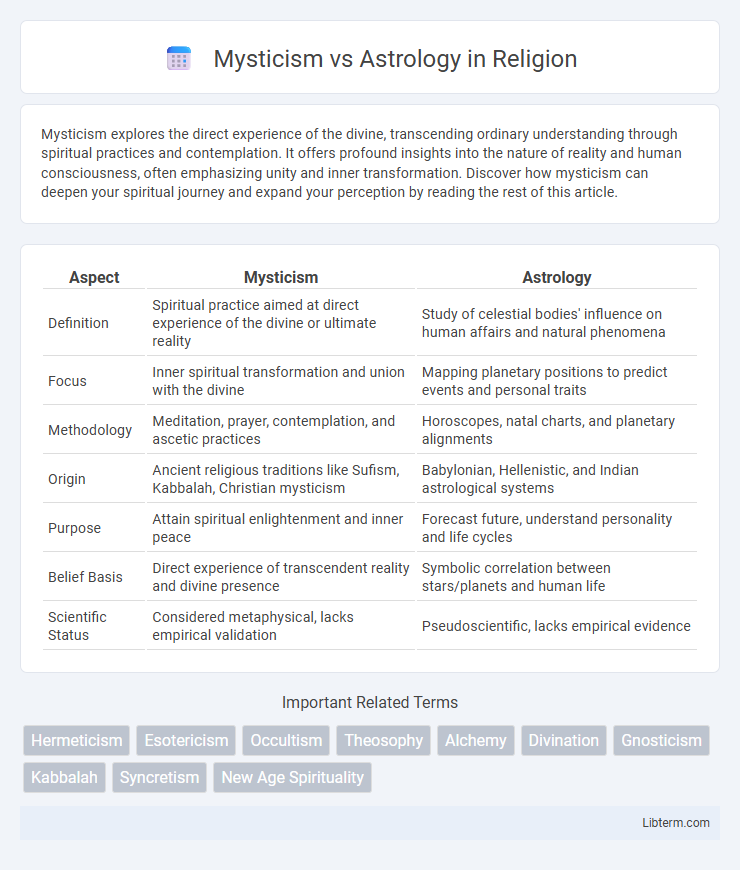Mysticism explores the direct experience of the divine, transcending ordinary understanding through spiritual practices and contemplation. It offers profound insights into the nature of reality and human consciousness, often emphasizing unity and inner transformation. Discover how mysticism can deepen your spiritual journey and expand your perception by reading the rest of this article.
Table of Comparison
| Aspect | Mysticism | Astrology |
|---|---|---|
| Definition | Spiritual practice aimed at direct experience of the divine or ultimate reality | Study of celestial bodies' influence on human affairs and natural phenomena |
| Focus | Inner spiritual transformation and union with the divine | Mapping planetary positions to predict events and personal traits |
| Methodology | Meditation, prayer, contemplation, and ascetic practices | Horoscopes, natal charts, and planetary alignments |
| Origin | Ancient religious traditions like Sufism, Kabbalah, Christian mysticism | Babylonian, Hellenistic, and Indian astrological systems |
| Purpose | Attain spiritual enlightenment and inner peace | Forecast future, understand personality and life cycles |
| Belief Basis | Direct experience of transcendent reality and divine presence | Symbolic correlation between stars/planets and human life |
| Scientific Status | Considered metaphysical, lacks empirical validation | Pseudoscientific, lacks empirical evidence |
Understanding Mysticism: Core Principles
Mysticism centers on direct, personal experiences of the divine or ultimate reality, emphasizing inner transformation and spiritual insight beyond ordinary perception. Core principles include the pursuit of unity with a transcendent source, contemplative practices such as meditation or prayer, and the belief that enlightenment arises from dissolving the ego and merging with a higher consciousness. Unlike astrology, which focuses on interpreting celestial influences on human life, mysticism seeks an intimate, experiential connection with the sacred through inner revelation.
Defining Astrology: Beliefs and Practices
Astrology is a belief system that interprets the positions and movements of celestial bodies to predict and influence human affairs and natural phenomena. Core practices include analyzing zodiac signs, planetary alignments, and birth charts to unveil personality traits, life events, and compatibility. Rooted in ancient traditions, astrology blends astronomical observations with symbolic meanings to guide decision-making and self-understanding.
Historical Roots of Mysticism and Astrology
Mysticism and astrology both trace their historical roots to ancient civilizations, with mysticism emerging from spiritual traditions focused on direct experiences of the divine, such as those found in early Hinduism, Sufism, and Christian mysticism. Astrology originated in Babylonian culture around the 2nd millennium BCE and was later integrated into Greek and Roman practices, where celestial bodies were believed to influence human fate and natural events. These ancient foundations highlight the distinct yet intertwined evolution of mysticism as a pursuit of transcendent knowledge and astrology as a method of interpreting cosmic patterns.
Key Differences: Mysticism vs Astrology
Mysticism centers on personal spiritual experiences and the pursuit of direct knowledge of the divine, while astrology interprets celestial movements to predict human affairs and natural phenomena. Mysticism emphasizes inner transformation and transcendence, contrasting with astrology's systematic use of birth charts, zodiac signs, and planetary positions. The key difference lies in mysticism's subjective spiritual insight versus astrology's objective, symbolic framework for understanding cosmic influence.
Philosophical Foundations Compared
Mysticism and astrology differ fundamentally in their philosophical foundations; mysticism centers on direct experiential knowledge of the divine or ultimate reality through inner transformation and spiritual practice, emphasizing personal enlightenment and transcendence beyond ordinary perception. Astrology, grounded in the belief of celestial influence, interprets cosmic patterns and planetary movements as determinants or indicators of individual destiny and personality traits, relying on a metaphysical framework linking the macrocosm and microcosm. While mysticism prioritizes subjective spiritual experience and unity with the absolute, astrology operates through systematic symbolic correlations rooted in ancient cosmological doctrines.
Methods of Spiritual Insight
Mysticism relies on direct, experiential methods such as meditation, contemplation, and inner revelation to achieve spiritual insight, emphasizing personal union with the divine. Astrology uses symbolic interpretation of celestial patterns, like natal charts and planetary transits, to provide guidance and predictions about individual lives and cosmic influences. Both methods seek deeper understanding but utilize fundamentally different approaches--mysticism through inward transcendence and astrology through external cosmic symbolism.
The Role of Symbols and Archetypes
Symbols and archetypes serve as essential tools in both mysticism and astrology, guiding the interpretation of spiritual and cosmic meanings. In mysticism, symbols often represent universal truths and inner experiences that transcend rational understanding, while astrology uses archetypal symbols such as zodiac signs and planetary positions to map human behavior and destiny. The shared reliance on symbolic language highlights the human quest to decode hidden patterns and connect with deeper layers of reality.
Popular Misconceptions and Myths
Mysticism is often mistakenly equated with astrology, but while astrology involves interpreting celestial movements to predict human events, mysticism emphasizes direct spiritual experiences and inner transformation. Popular misconceptions wrongly claim astrology is a science, yet it lacks empirical evidence and relies on symbolic correlations, unlike mysticism, which is rooted in experiential knowledge beyond empirical validation. Many myths suggest both practices can definitively determine fate, but mysticism focuses on personal enlightenment rather than deterministic predictions.
Influence on Modern Spirituality
Mysticism and astrology significantly shape modern spirituality by offering distinct pathways for self-discovery and cosmic understanding. Mysticism emphasizes direct, personal experiences with the divine or ultimate reality through meditation and contemplation, fostering inner transformation and spiritual awakening. Astrology provides a symbolic framework linking celestial patterns with human behavior and life events, helping individuals navigate life through personalized insights and cosmic cycles.
Choosing Your Path: Mysticism or Astrology?
Choosing your path between mysticism and astrology depends on whether you seek spiritual enlightenment through personal inner experiences or desire insights based on cosmic patterns and planetary movements. Mysticism emphasizes direct connection with the divine and transcendence beyond physical reality, offering practices like meditation and contemplation. Astrology provides a systematic approach by interpreting celestial positions to guide personality understanding and life decisions.
Mysticism Infographic

 libterm.com
libterm.com